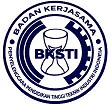Model optimasi penjadwalan pallet dan dunnage untuk meminimasi makespan
Abstract
Keywords
Full Text:
PDFReferences
J. Blazewicz, K. H. Ecker, E. Pesch, G. Schmidt, M. Sterna, and J. Weglarz, Handbook on Scheduling. 2019.
C. Bierwirth and J. Kuhpfahl, “Extended GRASP for the job shop scheduling problem with total weighted tardiness objective,” Eur. J. Oper. Res., vol. 261, no. 3, pp. 835–848, 2017, doi: 10.1016/j.ejor.2017.03.030.
M. Yazdani, A. Aleti, S. M. Khalili, and F. Jolai, “Optimizing the sum of maximum earliness and tardiness of the job shop scheduling problem,” Comput. Ind. Eng., vol. 107, pp. 12–24, 2017, doi: 10.1016/j.cie.2017.02.019.
J. G. Kim, H. B. Jun, J. Y. Bang, J. H. Shin, and S. H. Choi, “Minimizing tardiness penalty costs in job shop scheduling under maximum allowable tardiness,” Processes, vol. 8, no. 11, pp. 1–15, 2020, doi: 10.3390/pr8111398.
P. Kongsri and J. Buddhakulsomsiri, “A Mixed Integer Programming Model for Unrelated Parallel Machine Scheduling Problem with Sequence Dependent Setup Time to Minimize Makespan and Total Tardiness,” 2020 IEEE 7th Int. Conf. Ind. Eng. Appl. ICIEA 2020, pp. 605–609, 2020, doi: 10.1109/ICIEA49774.2020.9102086.
D. S. Widodo, “Improve Algoritma Hodgson Untuk Meminimasi Jumlah Job Terlambat Pada Penjadwalan Flow shop,” J. Tek. Ind., vol. 19, no. 1, p. 73, 2018, doi: 10.22219/jtiumm.vol19.no1.75-83.
Y. Muharni, E. Febianti, and N. N. Sofa, “Minimasi Makespan Pada Penjadwalan Flow Shop Mesin Paralel Produk Steel Bridge B-60 Menggunakan Metode Longest Processing Time Dan Particle Swarm Optimization,” J. Ind. Serv., vol. 4, no. 2, 2019, doi: 10.36055/jiss.v4i2.5154.
K. C. Ying and S. W. Lin, “Minimizing makespan for the distributed hybrid flowshop scheduling problem with multiprocessor tasks,” Expert Syst. Appl., vol. 92, pp. 132–141, 2018, doi: 10.1016/j.eswa.2017.09.032.
C. C. Wu, J. Y. Chen, W. C. Lin, K. Lai, S. C. Liu, and P. W. Yu, “A two-stage three-machine assembly flow shop scheduling with learning consideration to minimize the flowtime by six hybrids of particle swarm optimization,” Swarm Evol. Comput., vol. 41, no. October 2017, pp. 97–110, 2018, doi: 10.1016/j.swevo.2018.01.012.
X. Chai, W. Li, and Y. Zhu, “Online scheduling to minimize maximum weighted flow-time on a bounded parallel-batch machine,” Ann. Oper. Res., vol. 298, no. 1–2, pp. 79–93, 2021, doi: 10.1007/s10479-019-03352-6.
S. Wang, X. Wang, J. Yu, S. Ma, and M. Liu, “Bi-objective identical parallel machine scheduling to minimize total energy consumption and makespan,” J. Clean. Prod., vol. 193, pp. 424–440, 2018, doi: 10.1016/j.jclepro.2018.05.056.
T. Meng, Q. K. Pan, and L. Wang, “A distributed permutation flowshop scheduling problem with the customer order constraint,” Knowledge-Based Syst., vol. 184, p. 104894, 2019, doi: 10.1016/j.knosys.2019.104894.
L. Ghalami and D. Grosu, “Scheduling parallel identical machines to minimize makespan:A parallel approximation algorithm,” J. Parallel Distrib. Comput., vol. 133, pp. 221–231, 2019, doi: 10.1016/j.jpdc.2018.05.008.
D. M. Utama, “Pengembangan Algoritma Neh Dan Cds Untuk Meminimasi Consumption Energy Pada Penjadwalan Flow Shop,” Pros. SENTRA (Seminar Teknol. dan Rekayasa), no. 4, pp. 47–54, 2019.
M. S. Nagano, F. S. de Almeida, and H. H. Miyata, “An iterated greedy algorithm for the no-wait flowshop scheduling problem to minimize makespan subject to total completion time,” Eng. Optim., vol. 53, no. 8, pp. 1431–1449, 2021, doi: 10.1080/0305215X.2020.1797000.
DOI: http://dx.doi.org/10.36055/jiss.v7i1.13027
Refbacks
- There are currently no refbacks.
 is supported by
is supported by








